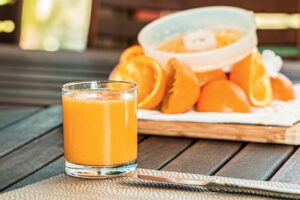 A poll of more than 3,000 adults, commissioned by the Fruit Juice Science Centre, has found that two thirds of Brits (65%) and more than a third of French and German adults (34%) drink 100% fruit juice to support their immune function. The beverage was most frequently listed after fruit and vegetables amongst the top immunity-support foods.
A poll of more than 3,000 adults, commissioned by the Fruit Juice Science Centre, has found that two thirds of Brits (65%) and more than a third of French and German adults (34%) drink 100% fruit juice to support their immune function. The beverage was most frequently listed after fruit and vegetables amongst the top immunity-support foods.
However, there was less awareness about the nutrients provided in fruit juice, with just half of adults overall agreeing that a daily glass is rich in vitamins and minerals. Fewer than a fifth in France and Germany, and a third in the UK, knew that antioxidants – such as vitamin C – can be found in fruit juice. And most didn’t realise that fruit juice contains polyphenols – beneficial plant compounds also found in fruit, vegetables, and cocoa.
With internet searches on vitamin C soaring during the pandemic, nevertheless four in 10 Brits and Germans, and more than half of French didn’t know that vitamin C is necessary for healthy immune function. This is despite six in 10 being more aware of immune health since the pandemic.
Commenting on the survey, Dr Carrie Ruxton from the Fruit Juice Science Centre – fruitjuicesciencecentre.eu/fr – said: “Awareness of how a glass of fruit juice supports normal immunity has improved but there are still some misconceptions. Considering that 100% juice is simply squeezed fruit – and has practically identical sugars, vitamins, and positive bioactive compounds compared with whole fruit – there is still a lot of nonsense claimed about fruit juice.
“A key myth is that sugar is added to fruit juice, which it isn’t since that would be illegal in the EU and UK. Another is that the vitamin C in packaged fruit juice is destroyed – that’s also untrue. Neither is it correct to say that pure fruit juice contains preservatives and colours, although thankfully only one in 10 people in our Poll believed that.”
Five facts on fruit juice – from the Fruit Juice Science Centre
• Just one small glass of 100% fruit juice provides more than 80% of the vitamin C recommendation. Vitamin C is an antioxidant and essential for normal immunity;
• Orange juice is one of the richest sources of hesperidin, a polyphenol that has anti-inflammatory effects;
Fruit juice is high in potassium, a mineral that helps to control blood pressure;
It takes one or two oranges to make a 150 ml glass of fruit juice and all the sugars in fruit juice come from the fruits used to make them – none is added;
Apple, orange, and grapefruit juices are all low GI (glycaemic index) meaning that they raise blood sugars more slowly compared with high GI foods, such as rice, bread, or sugar-sweetened drinks.
How about sugar
The Fruit Juice Science Centre poll found that eight in 10 adults believe that 100% fruit is not high in sugar. Additionally, a quarter of Brits (24%) and Germans (28%), and more than a third of French (35%), think that pure fruit juice is actually low in sugar. The reality is that a typical glass of orange juice contains the same level of natural sugars (around 13g) as a couple of oranges.
Dr Ruxton says: “Fruit juice is enjoyed by millions of people every day and most seem to recognise that it has a positive role in the diet. Given that most of the sugar we eat comes from sugar-sweetened drinks, biscuits, cakes, confectionery and desserts – foods which are low in essential nutrients – it’s clear where we need to turn our attention to cut sugar intakes.”


